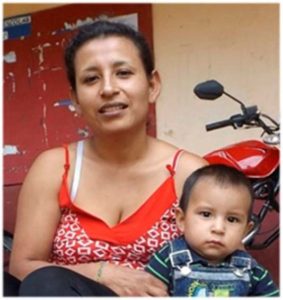
—María Aurora Ipia Belálcazar
María Aurora Ipia Belálcazar is a coffee grower in El Cidral, Caldono (Cauca). A single mother, she not only cares for her two children (aged 18 months and 7 years) but also looks after her two aging parents, whose delicate health prevents them from working in the fields. Since María Aurora’s coffee-growing activities on her one-hectare plot do not provide her with enough income, she also works as a day laborer on other people’s farms, using a machete as her tool.
This is all changing, however, thanks to a productive project subsidy from the Colombian Institute for Rural Development, facilitated by the USAID Land and Rural Development Program. With USAID assistance, María Aurora and 13 other coffee-growing families successfully designed a proposal for an income-generating productive project centered on the cultivation of coffee and plantains. By securing the subsidy, they now have access to the funds, machinery, and know-how that was previously out of reach. María Aurora, for example, will be able to expand her one-hectare plot to two hectares, and will have the resources to ensure that her crops get the nutrients, water, and attention they need to thrive.
In five focus regions of Colombia (Cauca, Cesar, Meta, Montes de María, and Tolima), the Land and Rural Development Program works with government entities to address the barriers that hamper the flow of money into rural areas. In the department of Cauca, the program has helped mobilize 148 subsidies valued at US$1.07 million. In addition to mobilizing resources, USAID is supporting the design of a model that improves the efficiency of funding mechanisms, making the funding process less cumbersome and increasing harmonization between government entities at the local, regional, and national levels

